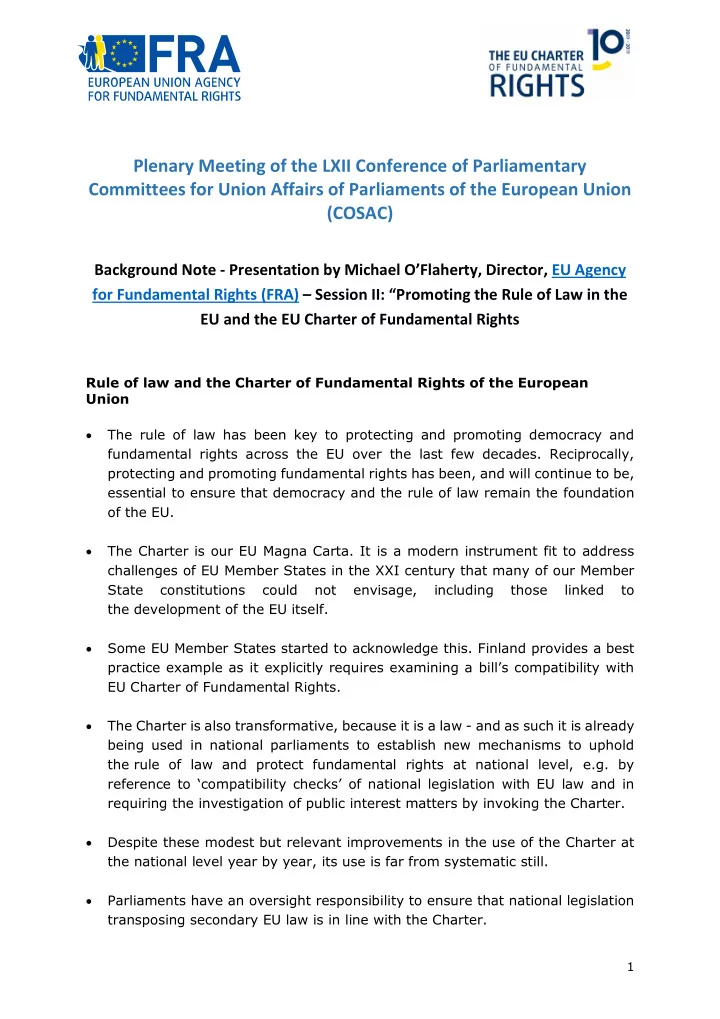

Plenary Meeting of the LXII Conference of Parliamentary Committees for Union Affairs of Parliaments of the European Union (COSAC) Background Note - Presentation by Michael O’Flaherty, Director, EU Agency for Fundamental Rights (FRA) – Session II: “Promoting the Rule of Law in the EU and the EU Charter of Fundamental Rights Rule of law and the Charter of Fundamental Rights of the European Union The rule of law has been key to protecting and promoting democracy and fundamental rights across the EU over the last few decades. Reciprocally, protecting and promoting fundamental rights has been, and will continue to be, essential to ensure that democracy and the rule of law remain the foundation of the EU. The Charter is our EU Magna Carta. It is a modern instrument fit to address challenges of EU Member States in the XXI century that many of our Member State constitutions could not envisage, including those linked to the development of the EU itself. Some EU Member States started to acknowledge this. Finland provides a best practice example as it explicitly requires examining a bill’s compatibility with EU Charter of Fundamental Rights. The Charter is also transformative, because it is a law - and as such it is already being used in national parliaments to establish new mechanisms to uphold the rule of law and protect fundamental rights at national level, e.g. by reference to ‘compatibility checks’ of national legislation with EU law and in requiring the investigation of public interest matters by invoking the Charter. Despite these modest but relevant improvements in the use of the Charter at the national level year by year, its use is far from systematic still. Parliaments have an oversight responsibility to ensure that national legislation transposing secondary EU law is in line with the Charter. 1
A persistent difficulty is that knowledge of the Charter is still insufficient, including among law-drafters. They often lack certainty on how to apply the Charter and when to apply it. This is why initiatives such as that again taken by our host country, Finland, of training civil servants on the Charter are laudable. Similarly, Parliaments could explore the possibility to provide training on the Charter to both MPs and parliamentary staff. Good support for Parliaments in implementing the Charter could be drawn from National Human Rights Institutions, which must also consider the Charter in their work. While the Charter codifies the foundational values of the EU, the rights and freedoms applicable in the EU, it also incorporates rights necessary to meet the ‘future’ needs of the EU and its citizens. For example, when it comes to issues of privacy, social rights, environmental protection or guarantees on bioethics and transparent administration. FRA’s m andate and tasks The European Union Agency for Fundamental Rights (FRA) is a decentralised agency of the European Union (EU), established in 2007. FRA’s mandate is to provide independent, evidence-based assistance and expertise on fundamental rights to EU institutions and to Member States within the scope of EU law. FRA does so by collecting and analysing robust data, and by principally providing tailored expertise and technical assistance on the ground. Its work covers the EU Member States, as well as North Macedonia and Serbia (which participate as observers in FRA). FRA offers a continued support to national parliaments and hopes to increase this cooperation in the years to come. For example, FRA experts are often invited to contribute to parliamentary debates in various EU Member States. FRA has a wealth of available evidence, data and publications on a range of topics, including country level data, relevant to the day-to-day responsibilities of national parliaments. FRA is available to discuss this data with national parliaments, and highly welcomes a feedback on specific needs for future data collection and analysis. It has set up a network of focal points within national parliamentary administrations to facilitate the flow of information. 2
Related FRA publications/resources: Publication: EU Charter - Use and added value in EU Member States Publication: Applying the Charter of Fundamental Rights of the European Union in law and policymaking at national level - Guidance Charterpedia FRA Charter resources Conference: Celebrating 10 years of the EU Charter of Fundamental Rights, 12 November FRA paper on civil society organisations' and national human rights institutions' awareness of the Charter, prepared for the Conference Fundamental Rights Report 2019: EU Charter of Fundamental Rights and its use by Member States 3
Recommend
More recommend